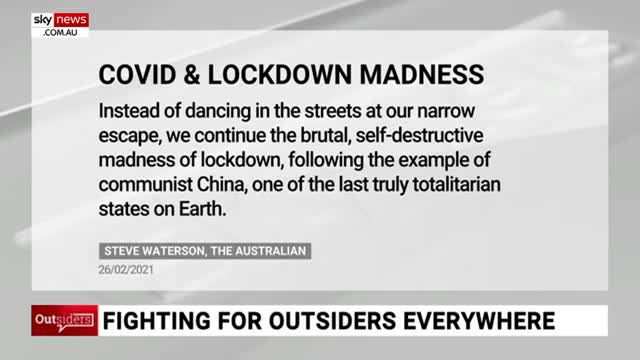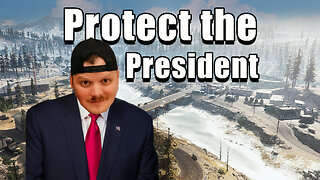Premium Only Content

Rowan Dean: No 'Conspiracy Theory', 'secret agenda' about The Great Reset
Sky News host Rowan Dean says there is no “secret agenda” about World Economic Forum’s Great Reset - they are shouting it from the rafters.
“This is the plan by the World Economic Forum to encourage governments to use all the levers they use during lockdown, enforced business closures, 23 hour lockdowns, restricting how far you can go from your home and ridiculously aggressive policing tactics, in order to tackle climate change,” Mr Dean said.
“The Guardian last week ran a lengthy and to be frank fairly tedious article by someone I'd never heard of called Anne Davies attacking me for 'spreading conspiracy theories' about the Great Reset, accompanied by a photo of myself looking suitably deranged and unhinged.
“I have only ever repeated the words of Klaus Schwab at the World Economic Forum, the words of Prince Charles, the words of the head of the United Nations Guterres and many other very powerful and influential individuals who insist we must go straight from COVID lockdowns to climate lockdowns.”
......................
Covid Made Far Worse By Our Weak Politicians
Published on March 6, 2021
Written by The Australian
This should never have been a disaster on the scale of a world war. But the modern politician’s career path doesn’t encourage or reward mental agility.
Last August I made my first visit to the northern NSW town of Tweed Heads. Captivated by a dazzling stretch of beach at the end of a side street, I strolled towards it, only to discover I had strayed across the closed border into Coolangatta, in the People’s Democratic Republic of Palaszczuk.
Fearing a monumental fine, I slipped unseen back into NSW and retreated to the nearest pub to steady my nerves. A smiling old lady guarding the door asked where I was from.
“Sydney,” I said.
Her face clouded.
“Not from one of these hotspots,” she said, holding up a list of suburbs.
“No,” I said, showing her my driving licence. “Lane Cove. It’s not on your list.”
“What about these ‘Eastern Suburbs’?” she said, pointing. “Are you sure it’s not one of those?”
“Quite sure,” I replied.
She looked close to tears. “It’s just that I’ve hardly ever been to Sydney,” she said, “so I don’t know where these places are.”
“Would it be easier,” I said, “if I just went somewhere else?”
Her face lit up. “Aah, would ya, darl?”
“No worries,” I said as I left. “We’re all in this together.”
I thought around that time that things couldn’t get more ridiculous, but how wrong I was. It was clear almost a year ago that COVID-19 was a serious respiratory infection, a bad flu-like virus, but that unlike the target-rich flu we’ve always lived with, its victims were the old, the infirm, the morbidly obese, people living with multiple deleterious conditions.
Even so, their average age at death was generally a couple of years above the average life expectancy. In June I wrote in these pages that it would be interesting to see the true, unvarnished, unspun data on deaths, and now it’s beginning to come in.
As various countries assemble their annual mortality rates, the figures suggest we should be relieved, celebrating the fact this pandemic was nowhere near as lethal as some had feared.
Here in Australia, this week’s data from the Bureau of Statistics, covering January 1 to November 24, 2020, registers 126,974 deaths, against an average of 127,872 over the past five years. Interestingly, influenza and pneumonia deaths in that 2020 period numbered 1952, against the five-year average of 3097.
Should we attribute that decline to the use of masks and social distancing, as we are encouraged to do; or is it faintly possible the missing 1000 people who would normally have died of flu and pneumonia are the ones who succumbed to COVID when it first arrived?
Did the virus simply tip those teetering on the verge of death into an earlier quarter?
We, of course, cut ourselves off from the world, so perhaps our figures are artificially low. So let’s consider the “nightmare scenario” playing out in Britain. Last month the UK’s Office of National Statistics added its provisional 2020 figures to a series that goes back almost 200 years.
It shows a rate of 1043.5 deaths per 100,000 population, ahead of 2019’s number of 925. I would describe that rise with the COVID-appropriate word “unprecedented”, except the rate has been higher before, most recently in 2008, when I don’t believe the world shut down.
Oh yes, and it was higher in every single year before 2008, right back to 1838, when the records begin.
So if the impact of deaths from COVID (and I think we all know by now we should be saying “with”, not “from”) is not as bad as it first appeared, why are British hospitals reported to be almost overflowing, at or near 90 per cent occupancy?
Unprecedented again, until you note the country’s National Health Service has the entirely reasonable efficiency goal of having fewer than 15 per cent of beds lying vacant at any time.
Or might the fact that in the past 30 years Britain has reduced the number of hospital beds from 300,000 to 140,000, while adding 10 million to its population, shed some light on the situation?
Sweden, poster nation for personal freedom during the pandemic, and whipping boy for lockdown enthusiasts, has recorded a 2020 death rate that has not been matched in its history since — drum roll, please — 2015. But, the critics point out, even King Carl XVI Gustaf has said they handled the crisis badly. I’d never known being a king gave you medical expertise, but I’m no authority on Scandinavian monarchy.
None of this is meant to diminish the seriousness of the virus; witnessing my father’s struggle in the late stages of pulmonary fibrosis taught me that death from a respiratory disease is a singularly unpleasant way to go.
But there are many vile diseases out there that can kill you, and the price we have exacted from the healthy to protect the sick, uniquely from this ailment, is out of all proportion, and it need not have been so.
Instead of dancing in the streets at our narrow escape, we continue the brutal, selfdestructive madness of lockdown, following the example of communist China, one of the last truly totalitarian states on Earth. Who saw the Chinese welders sealing citizens into their Wuhan apartments and thought “what a terrific idea?”. Our state
leaders, clearly, and their moronic counterparts around the world.
Meanwhile, we have quietly acquiesced to the shutdown of our state borders on the most trivial grounds; and watched, without protest, as our international border was closed, and not just to incoming traffic.
Never mind the absurd and selfish obstacles presented to Australian citizens hoping to come home after study or work — or, God forbid, a holiday — overseas; you are currently forbidden, like a North Korean, to leave your country unless you apply for an exemption, to be assessed by some Border Force bureaucrat. We are a nation of immigrants and dual citizens with ties that circle the globe; the gap-year wandering has long been a rite of passage.
What possible impact can your departure have on the nation’s health?
And if another country is happy to accommodate you, what business is it of the government to prevent you leaving?
Again, these are the kind of restrictions conceived and imposed by some of the most wicked states in human history, and we should be embarrassed and disgusted to add our name to that list. So the cost piles up, hundreds of billions of dollars now, with little but devastation and paranoia to show for it. Amid this vast ocean of incompetence and mindless disassembly of our economy, NSW’s handling of the crisis is widely acclaimed as an
island of common sense.
Which only goes to show how badly our other federal, state and territory leaders have performed. A year ago the notion of shutting down the whole of Sydney’s northern beaches over Christmas because a couple of dozen people had tested positive for a flu-like virus in Avalon would have seemed beyond preposterous; an utter impossibility.
Only because we are acclimatised to fantastically more ludicrous overreactions do we consider such an astonishing response “measured”. And these were “cases”, remember, many of them completely asymptomatic. In the old days of common sense, you only knew if people had flu if they were ill enough to stay home from work and see a doctor.
Now, if you walked through a shopping centre when someone who didn’t know they had the disease was buying their groceries, you’re ordered to have a test to see if you also don’t know you have it. Perhaps there’s something super-tough about super-spreaders, but in my experience flu victims are tucked up in bed whimpering and mainlining Lemsip, not driving Ubers, strolling round the gardening aisles of Bunnings or choosing finger buns at
Bakers Delight.
That’s what makes COVID so insidiously deadly. You don’t know you have the virus, and you might pass it on to someone else who wouldn’t know they had it, and eventually it might make its way to someone it could really hurt: a very old person or someone with severe co-morbidities.
Logic might suggest the last person in that chain is the one who should be taking precautions, but not in the fevered fantasies of our governments.
As some have been saying since the start of the mass hysteria, we should have been looking after the vulnerable, who form a tiny proportion of the population. They, and anyone else who fears the disease, could stay at home, shop and work online, keep in shape with some loungeroom exercise, entertain no visitors, have food delivered to their door.
It’s exactly the same as living in Victoria, except people who don’t share your terror can get on with their own lives and businesses. And now the vaccine is being rolled out, we’ll soon be protected. Which should mean we don’t have to fear people who aren’t. Once the vulnerable have had their shots we should return to normal, by which I mean the old normal, not some twisted “new” normal. And then the country should be released immediately and completely from the multiple intrusions on our privacy and civil rights.
There should be no more dehumanising masks. No anti-social distancing. No more testing. No QR codes. No
track and trace. No hotel quarantine. Let’s stand elbow to elbow at the bar, and cheer lustily at the football. Let’s see if the constabulary can return to policing by consent and regain our respect.
This should never have been a disaster on the scale of a world war. Leaders worthy of the name would have calmed those prone to panic, and allayed the fears of the vulnerable and their families by working out how to protect them. They would have accepted from the start that some would rather face the risk of infection, perhaps because, like my father, they knew their remaining time on Earth was short and wished to spend it with their families. Nimble minds would have come up with smart systems to accommodate the huge range of attitudes to this threat, in order to safeguard the people who needed and, more importantly, wanted protection.
But the modern politician’s career path of student politics to minister’s office to safe seat doesn’t encourage or reward mental agility; the years of business experience that might tell you that restaurants buy expensive, perishable stock before a fully booked holiday weekend is time wasted in the scramble to reach the trough of public money.
I don’t subscribe to the swirling conspiracy theories that say this is all an evil plan to destroy our economy and weaken Western civilisation to facilitate a new world order, although it might as well be. I suspect the catastrophe is rather the consequence of years of hollowing out the political class, the relentless, self-perpetuating promotion of game-playing mediocrities who lack the wit and imagination to deal with a fluid, complex problem.
They might have slick presentation skills and a glib facility with words, but would any of them command respect in any other field?
So no, self-congratulating leaders, you have not “kept us safe”. You have destroyed thousands of businesses, families, lives and futures. You have cheated people of the highlights of human existence, the moments of shared joy and sorrow, the weddings, births, anniversaries, farewells and funerals that mark our journey through life.
You have placed unimaginable burdens of debt and despair on future generations, and crafted a dangerous template for all the idiots who follow you. And to use your own arrogant formulation, I make no apology for saying that.
About the author: Steve Waterson is commercial editor of The Australian. He studied Spanish and French at Oxford University, where he obtained a BA (Hons) and MA, before beginning his journalism career.
-
 9:55
9:55
TheSmithsOfLiberty
4 years ago $2.35 earnedThe Great Reset!!
5.96K4 -
 2:19
2:19
Donald Trump Jr.
4 years agoA Great Story About Rush Limbaugh
35.3K56 -
 LIVE
LIVE
The Bubba Army
20 hours agoTaylor Swift & Travis Kelce ENGAGED! - Bubba the Love Sponge® Show | 8/27/25
4,983 watching -
 40:14
40:14
Uncommon Sense In Current Times
15 hours agoThe Dating Crisis in America | J.P. De Gance on the Church’s Role in Restoring Family & Faith
25.4K2 -
 12:35
12:35
Red Pill MMA
17 hours agoNow We Know The Truth.. Hero Who Stopped Raja Jackson Speaks Out
2.84K1 -
 41:04
41:04
Coin Stories with Natalie Brunell
1 day agoCooking, Culture & Crypto: Norma Chu’s Food Empire Turns Bitcoin Treasury
5.75K -
 8:03
8:03
MattMorseTV
16 hours ago $5.91 earnedThings in the UK just got INSANE...
84.2K121 -
 3:02:10
3:02:10
daniellesmithab
11 hours agoAlberta Next: Fort McMurray Town Hall
15K1 -
 2:11:17
2:11:17
Side Scrollers Podcast
19 hours agoINSANE Illegal Migrant Propaganda Xbox Game + Paypal REFUSES To Pay Dev + More | Side Scrollers
62.7K3 -
 20:58
20:58
GritsGG
1 day agoProtect the President Challenge on Warzone!
18.7K